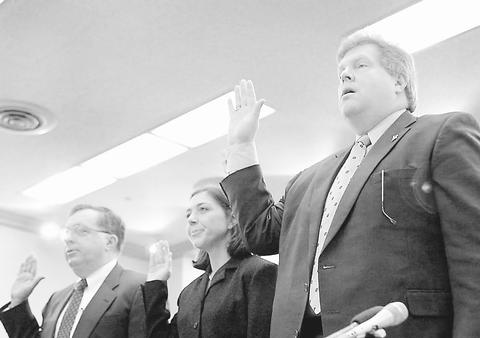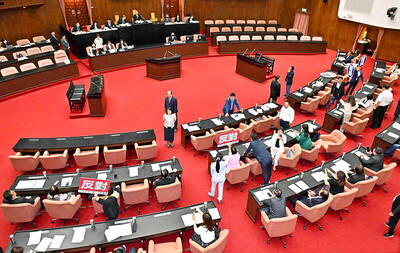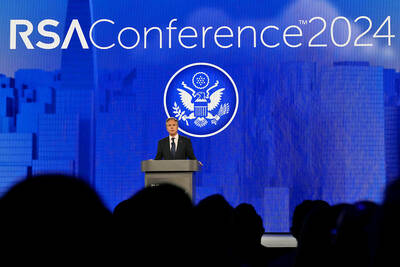Though the General Accounting Office plans to sue the White House to learn how much influence Enron and other energy companies had on the Bush administration's energy policies, one scorecard has been publicly available for months.
In its National Energy Strategy, a 170-page list of recommendations released in May, the Bush administration detailed its views on regulating electricity transmission, using coal and natural gas resources and controlling pollution, all vital to Enron.

PHOTO: NY TIMES
The company and its executives were among the largest contributors to President Bush -- and company officials including Kenneth L. Lay, the chief executive who resigned last week, had at least five meetings with administration officials to discuss energy. Yet the company's record on shaping the administration approach is mixed.
Energy experts and lobbyists say Enron had reason to celebrate some of the administration's recommendations, especially its efforts to create a nationwide electricity transmission grid. But the energy plan rejected or ignored many other Enron priorities, including the company's hopes of expanding the use of natural gas, controlling emissions of carbon dioxide and stripping states of their control of electricity transmission lines.
"It never looked like an Enron wish list to me," said Jonathan Weisgall, Washington representative for MidAmerican Energy Holdings, a utility company that also lobbied to shape the administration's energy policies.
"There were some things they and many other companies wanted that showed up there," Weisgall said. "On some things Enron wanted the most, they got nothing at all."
Take electricity transmission: Because Enron specialized in trading supplies of electricity, it pushed for years to create a more open, less-regulated transmission grid that would allow it to buy or sell electricity regardless of where the power was produced.
In interviews last spring with The New York Times and the PBS program "Frontline," Lay said that removing transmission bottlenecks was critical to the company. "It's the high-voltage backbone for the electric industries," he said. "It's kind of like a superhighway system for electricity."
An Enron memo drafted before Lay met Cheney to discuss energy policy in April expanded on the company's transmission goals. The memo, a copy of which Enron gave The Times last spring, called transmission failures a big reason "the benefits of competition have yet to be realized and have not yet reached consumers."
The final energy report reflects some of Enron's positions. The administration said it would urge federal regulators to promote open transmission. It also called for a new, self-regulatory body to oversee transmission grids, as Enron wanted.
Enron also asked the Bush administration to agree to seize private land for construction of more transmission towers.
The energy plan endorsed that idea.
But the administration declined to pursue the most aggressive of Enron's recommendations. Enron wanted the states to lose any jurisdiction over transmission and proposed to have federal regulators take full control because they would presumably break up regional monopolies. But the energy plan endorsed no such action.
Representative Henry Waxman, a Democrat from California, whose inquiries prompted the General Accounting Office inquiry last spring, argues that Enron's apparent influence was so sweeping that a thorough investigation was needed into how the administration compiled the energy plan.
Last month, Waxman identified 17 items in the report that he said benefited Enron. He added that "numerous policies in the White House energy plan are virtually identical to the positions Enron advocated."
Yet some energy experts and lobbyists said that most of the items were not specific favors for Enron, but broad policy goals that reflected a consensus of many energy companies, including Enron's competitors. When Enron's policy goals did not enjoy broad support, the company often struck out.
As a natural gas trader, Enron has long promoted the use of natural gas over coal. It has even advocated that the government cap carbon dioxide emissions by power plants as a way of encouraging utilities to switch to cleaner-burning natural gas. Enron also hoped to profit by trading emission rights.
The administration did not deliver for Enron on these counts.
On other issues, Enron's track record was uncertain. During the California energy crisis last year, the administration pleased Enron and other energy traders by taking a strong stand against caps on electricity prices. The administration also selected two candidates backed by Lay to serve on the Federal Energy Regulatory Commission, which oversees electricity trading.
But after the two Republican commissioners took office, they quickly adopted a plan to impose price controls in California. Some experts argue that this step eased price spikes and denied continued high trading profits to Enron and other companies.
Still, some critics said that even if the substance of the administration's energy policies did not always meet Enron's expectations, they often mirrored longstanding industry goals and neglected the concerns of environmentalists and consumer groups.
"It was the lips of industry to the ear of God," said Mark Cooper of the Consumer Federation of America. "This is an issue about process more than substance."

INSPIRING: Taiwan has been a model in the Asia-Pacific region with its democratic transition, free and fair elections and open society, the vice president-elect said Taiwan can play a leadership role in the Asia-Pacific region, vice president-elect Hsiao Bi-khim (蕭美琴) told a forum in Taipei yesterday, highlighting the nation’s resilience in the face of geopolitical challenges. “Not only can Taiwan help, but Taiwan can lead ... not only can Taiwan play a leadership role, but Taiwan’s leadership is important to the world,” Hsiao told the annual forum hosted by the Center for Asia-Pacific Resilience and Innovation think tank. Hsiao thanked Taiwan’s international friends for their long-term support, citing the example of US President Joe Biden last month signing into law a bill to provide aid to Taiwan,

STATE OF THE NATION: The legislature should invite the president to deliver an address every year, the TPP said, adding that Lai should also have to answer legislators’ questions The Chinese Nationalist Party (KMT) yesterday proposed inviting president-elect William Lai (賴清德) to make a historic first state of the nation address at the legislature following his inauguration on May 20. Lai is expected to face many domestic and international challenges, and should clarify his intended policies with the public’s representatives, KMT caucus secretary-general Hung Meng-kai (洪孟楷) said when making the proposal at a meeting of the legislature’s Procedure Committee. The committee voted to add the item to the agenda for Friday, along with another similar proposal put forward by the Taiwan People’s Party (TPP). The invitation is in line with Article 15-2

Premier Chen Chien-jen (陳建仁) and the Ministry of Foreign Affairs yesterday denounced Chinese Nationalist Party (KMT) Legislator Hsu Chiao-hsin (徐巧芯) for making false allegations about donations to Ukraine and disclosing confidential documents, with the ministry saying that it would take legal action. The ministry last year signed an agreement with the Czech Republic on a healthcare project to assist Ukraine, which is to be carried out by the Czech Health Technology Institute. Hsu accused the ministry of being indirectly involved in the party politics of the Czech Republic as institute chairman Petr Foit is a local medical supplier, and has close political

‘DIGITAL SOLIDARITY’: Taiwan, the US, Japan, Australia and New Zealand are to install and operate a cable that would connect up to 100,000 people in the Pacific Islands Taiwan, the US, Japan, Australia and New Zealand are working together to install undersea cables as a demonstration of digital solidarity, US Secretary of State Antony Blinken said on Monday. Blinken talked about the cooperation in a speech he delivered at the RSA Conference in San Francisco. He said that the US International Cyberspace and Digital Strategy launched by the US Department of State “treats digital solidarity as our North Star.” “Solidarity informs our approach not only to digital technologies, but to all key foundational technologies,” Blinken said. Under the strategy, the US is to work with international partners “to shape the design, development,